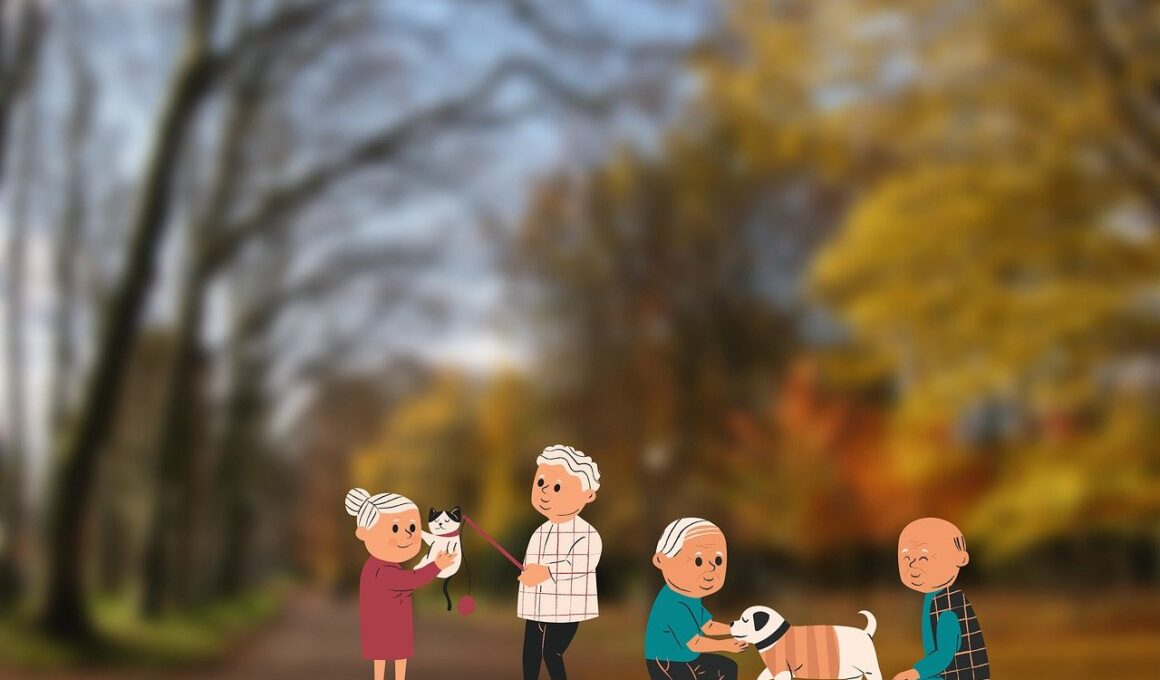The Impact of Nature on Senior Mental Health
Many studies have explored the link between nature and mental health, especially for seniors. Engaging with nature can provide significant emotional benefits. For older adults, who often experience loneliness and isolation, outdoor activities can be a remedy. Nature’s beauty has restorative properties that enhance well-being. Research shows that regular exposure to green spaces lowers stress levels. It also plays a role in reducing anxiety and depression symptoms. These benefits are vital for senior citizens. Some activities such as gardening, walking, or bird-watching can create opportunities for social interaction. Moreover, being outdoors encourages physical activity which is also beneficial for mental health. Engaging with others in these settings can foster friendships and support networks, enhancing feelings of community belonging. Furthermore, the tranquility that nature provides can mitigate feelings of sadness and loneliness. It’s essential for caregivers and family members to encourage seniors to spend time outdoors. A brief exposure to sunlight and fresh air can invigorate both the body and the mind. In conclusion, prioritizing outdoor experiences for seniors can be instrumental in improving their mental health.
Benefits of Outdoor Activities
Outdoor activities offer numerous benefits for seniors that promote enhanced mental well-being. First and foremost, physical activity releases endorphins, which are natural mood lifters. Walking, hiking, or even gentle stretching in a park can drastically improve one’s outlook on life. This creates a natural synergy between physical fitness and mental health. Secondly, being outside helps with cognitive function. Exposure to nature encourages mindfulness and can help seniors become more present in the moment. This can lead to reduced cognitive decline, making outdoor activities essential for mental agility. Third, nature can inspire creativity and encourage seniors to explore new hobbies. Whether painting landscapes or photography, these pursuits foster joy and personal expression. Additionally, outdoor activities often provide a venue for community engagement. Connecting with others during group walks or garden clubs fosters relationships and strengthens social ties. These social interactions combat feelings of isolation and loneliness. Families should strive to make outdoor excursions part of their regular routines. Not only are these outings crucial for the mental health of seniors, but they also create memories that enrich relationships.
Seniors often face numerous age-related challenges, including limited mobility and health issues. However, nature can serve as a powerful ally in overcoming these barriers. Simple activities, such as seated exercises or birdwatching, allow seniors to reap nature’s benefits without excessive physical strain. Moreover, the social aspect of outdoor activities cannot be underestimated. Joining a local walking group or participating in community gardening can offer emotional support and friendship while also being physically engaging. It’s essential to choose activities that align with individual capabilities and interests to promote participation. Even visiting a local botanical garden or park for a leisurely stroll can have profound effects. Incorporating these activities into daily routines can transform their lives, offering purpose and enjoyment. Furthermore, the sights and sounds of the outdoors can stimulate the senses, improving overall quality of life. Caregivers should encourage seniors to create a balance between indoor and outdoor time. Promoting an active lifestyle can enhance positivity and mental resilience. The overall challenge is to find suitable outdoor activities that meet the needs of older adults while ensuring their safety and comfort.
The Role of Nature in Stress Reduction
Nature plays a significant role in stress reduction among seniors. Natural environments are inherently calming and can reduce cortisol levels, the hormone associated with stress. Time spent in nature provides an escape from the hustle and bustle of daily life, allowing seniors to disconnect and recharge. Furthermore, research shows that even short periods in natural settings can yield immediate stress-relieving benefits. Activities such as fishing or picnicking can provide a serene backdrop, decreasing anxiety levels while enhancing happiness. For seniors, the ability to engage in mindful practices outdoors can be a game changer. Techniques like meditation and deep breathing can be practiced amidst nature’s tranquility, further promoting health benefits. Many parks and gardens offer excellent spaces for these exercises. Listening to water flowing or birds singing contributes to emotional balance. Local parks provide an accessible option for daily outings. Families can facilitate these trips, making them integral to their loved one’s routine. Therefore, the essence of nature serves as a refuge, fostering emotional recovery and improving overall mental health for seniors.
As we understand the influence of nature on mental health, it’s vital to recognize the barriers some seniors might face. Limited mobility, transportation issues, and health constraints can prevent them from experiencing the outdoors. Community initiatives can significantly bridge this gap, offering tailored programs for seniors struggling to access nature. Local organizations could establish regular outings or maintain accessible gardens specifically designed for seniors. Ensuring that these spaces are welcoming and easy to navigate encourages active participation in nature-focused activities. Additionally, educational workshops can empower seniors, teaching them about the mental health benefits of nature. Online platforms can provide virtual tours of parks and gardens for those unable to travel. Furthermore, technology can play a role in promoting outdoor activities. Fitness trackers or social media platforms can connect seniors with outdoor enthusiasts, inspiring them to join or create local walking groups. This way, they can develop friendships over shared passions while engaging in health-promoting activities. Addressing these barriers can significantly enhance the positive effects of nature for mental health among seniors, ultimately leading to more fulfilling lives.
Connecting with Nature through Technology
In an increasingly digital age, technology can enhance seniors’ connection with nature without them physically being outdoors. Virtual reality experiences, for instance, can simulate outdoor environments, providing therapeutic benefits. These platforms allow seniors limited by mobility or health issues to experience nature from the comfort of home. Such experiences can help alleviate feelings of isolation. Additionally, many apps are available that guide users through mindfulness exercises set against the backdrop of nature sounds. This practice serves not only to relax the mind but also to engage seniors in meditation. Gardens and parks can be explored through various interactive online platforms, allowing seniors to learn more about ecosystems and planting while inspiring them to create their gardens. Moreover, social media can encourage seniors to participate in outdoor photography and share their experiences, cultivating a sense of community. Families can work together to explore outdoor events, outings, or even day trips to national parks. Such planned activities foster shared experiences that strengthen family bonds. Therefore, technology can act as a bridge between seniors and the enriching mental health benefits that nature provides.
Encouraging connection with nature among seniors has significant long-term mental health benefits. Fostering an environment where outdoor activities are encouraged can lead to improved outlooks, better social interactions, and mental resilience. Every small outdoor step counts—from a simple walk in the park to more organized gardening clubs. With appropriate support, seniors can engage meaningfully with their communities while immersing themselves in nature. Families play a critical role in ensuring that their loved ones have the opportunities to connect with the outdoors regularly. Regular outdoor activities can become part of the weekly routine, encouraging consistency and sustainable mental health benefits. It’s essential for those who care for seniors to recognize the immense value of nature as a wellness tool. When seniors incorporate nature into their schedules, it fosters a sense of purpose and belonging. Additionally, health professionals should embrace the holistic benefits of nature in treatment plans for older adults. Community health initiatives should explore outdoor programming as a primary strategy for enhancing senior mental health. In summary, the overall emphasis should remain on active engagement with nature, contributing positively to mental well-being.
Emphasizing the importance of nature in sustaining mental health is crucial as we navigate our aging population. Through various outdoor activities, seniors can experience an enhanced quality of life, promoting both physical and mental fitness. As society understands the profound connection between nature and mental health, it allows for better policies and programs to support this demographic. By creating more accessible outdoor spaces and fostering opportunities for participation, communities can encourage seniors to partake in activities that enhance their wellbeing. Moreover, educational campaigns can raise awareness about the benefits of nature. Collaborating with healthcare providers can align outdoor initiatives with mental health recommendations. Encouraging local businesses to sponsor outdoor events for seniors can also promote engagement. Families should remain active participants in this journey, seeking out activities for their loved ones that encourage outdoor exploration. Ultimately, with a collective effort, society can create environments where seniors thrive, both mentally and physically. With a commitment to integrating nature into daily routines, profound positive changes can occur. As we recognize these benefits, we reshape how we approach senior health care, prioritizing nature as an essential element in fostering a healthier world.


